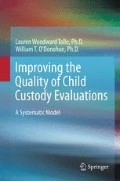Abstract
This chapter describes a preliminary randomly controlled trial of Family Court Judges’ evaluation of custody evaluations based on the Egregious/Promotive Factors Model vs. evaluation as usual. Although a key measure is the predictive validity of various models, data from this study can at least give preliminary information about the construct validity of the proposed model.
Access this chapter
Tax calculation will be finalised at checkout
Purchases are for personal use only
References
Ackerman, M. J., & Ackerman, M. (1997). Custody evaluation practices: A survey of experienced professionals (revisited). Professional Psychology: Research and Practice, 28, 137–145.
Bow, J. N., & Quinnell, F. A. (2002). A critical review of child custody evaluation reports. Family Court Review, 40(2), 164–176.
Emery, R. E. (1999). Marriage, divorce, and children's adjustment. California: Sage.
Gourley, E. V., & Stolberg, A. L. (2000). An empirical investigation of psychologists’ custody evaluation procedures. Journal of Divorce and Remarriage, 33(1/2), 1–29.
Guttman, J., Ben-Archer, C., & Lazar, A. (1999). Withdrawal threshold in interpersonal conflict among adolescents of divorced parents. Educational Psychology: An International Journal of Experimental Educational Psychology, 19(2), 181–190.
Keilin, W. G., & Bloom, L. J. (1986). Child custody evaluation practices: A survey of experienced professionals. Professional Psychology: Research and Practice, 17, 338–346.
Rounsaville, B. J., Carroll, K. M., & Onken, L. S. (2001). NIDA’s stage model of behavioral therapies research: Getting started and moving on from Stage I Clinical Psychology: Science & Practice, 8, 133–142.
Author information
Authors and Affiliations
Rights and permissions
Copyright information
© 2012 Springer Science+Business Media, LLC
About this chapter
Cite this chapter
Tolle, L.W., O’Donohue, W.T. (2012). Methodology. In: Improving the Quality of Child Custody Evaluations. Springer, New York, NY. https://doi.org/10.1007/978-1-4614-3405-4_6
Download citation
DOI: https://doi.org/10.1007/978-1-4614-3405-4_6
Published:
Publisher Name: Springer, New York, NY
Print ISBN: 978-1-4614-3404-7
Online ISBN: 978-1-4614-3405-4
eBook Packages: Behavioral ScienceBehavioral Science and Psychology (R0)

